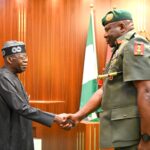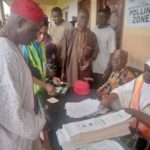As part of its efforts at ensuring a better electoral culture for Nigeria forthwith, the Independent National Electoral Commission (INEC) last week created 56,872 additional polling booths across the country, thereby raising the number of such facilities from the 119,974 which were established 25 years ago in 1997, to the current 176,846. Speaking at a meeting with Resident Electoral Commissioners in Abuja last week, the Chairman of INEC, Professor Yakubu Mahmoud, justified the development as driven by the commission’s intent to expand voters’ access to stress-free participation in electoral activities. Ostensibly intended for the success of the forthcoming 2023 general polls, the INEC chairman clarified that the changes may not affect the conduct of the soon-to-be held by-elections in the three states of Kaduna, Jigawa and Plateau. Meanwhile, voting points will no longer be used.
Clarifying further, the INEC helmsman stated that a total of 749 polling units were relocated or removed from inappropriate places some of which were nine from shrines, six from mosques, 21 from churches, 145 from royal palaces, and 232 from private property. Meanwhile, 336 hitherto polling units were relocated for reasons of distance, difficult terrain, congestions communal conflicts and general insecurity. With this dispensation, a new dawn seems to have been launched in Nigeria’s electoral space.
Seen in the context of the country’s lamentable history of electoral exercises, especially from the perspective of the causative factors for the serial failure of each exercise, this initiative by the INEC qualifies as a landmark dispensation in more than one dimension. To put it conservatively, the development qualifies as a most profound house-cleaning exercise which had remained hanging in the balance for too long. Hence it came as a most welcome intervention by the commission. Granted that one key factor which perennially undermines the liberty of voters to express their electoral choices during voting remains the hijack and personalization of polling units by powerful individuals as well as groups, to locations where the ordinary member of the public is denied free access, the development remains a game-changer that will impact positively on the country‘s electoral future. It needs to be recalled that even Professor Attahiru Jega, who preceded the incumbent as INEC chairman, had raised reservations over the challenge of restructuring the configuration of the country’s polling units, citing political pressures for the problem. The success of the current INEC in this exercise offers the promise of effectively checking such an anomaly as the personalisation and privatisation of voting to a significant extent. The fact that the INEC achieved this feat at a time of uncommon challenges it is facing including the destruction of its offices across the country, is also commendable.
Meanwhile, against the backdrop of such a success, Nigerians expect the commission to take this spirit into subsequent polls exercises and change the narrative with respect to elections in Nigeria. In that context, the commission should leave no stone unturned in its bid to reform the entire landscape of elections across the country. This point remains most cogent as the challenges of electoral reforms in Nigeria are, to say the least herculean, with the stress-free acceptance of electoral outcomes always proving a bitter pill for losers. This development if allowed to prevail will introduce significant transparency in the electoral process and make electoral outcomes easier to reconcile with by contestants.
Nevertheless, the success of INEC in establishing the new configuration should not translate into a ticket for diminished vigilance by the commission as it goes without saying that their initiative will be subjected to significant opposition as it erodes the comfort zones for hitherto beneficiaries of the decadent past scenario. That is why the commission should work out ways and means urgently to anticipate likely threats to its reforms and launch preemptive counter measures timeously, to ensure success in future polls. A key success factor for INEC in this venture is proactive public enlightenment, which always resolves conspiracies against public interest anytime, anywhere.

 Join Daily Trust WhatsApp Community For Quick Access To News and Happenings Around You.
Join Daily Trust WhatsApp Community For Quick Access To News and Happenings Around You.


